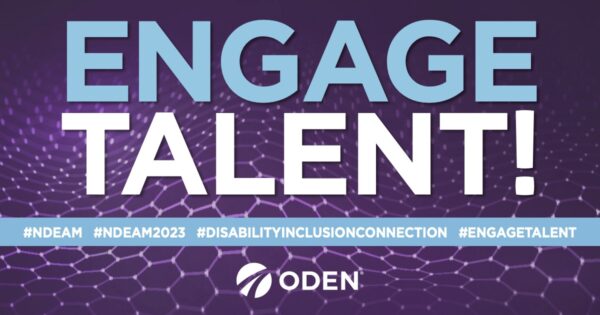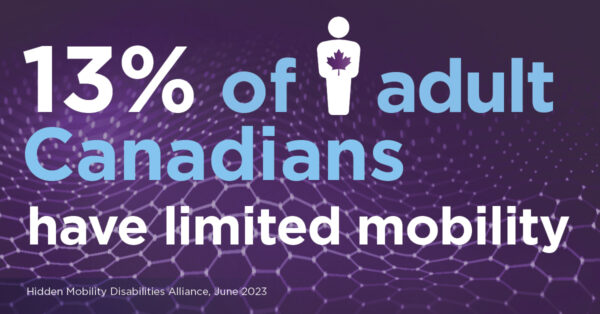LiveWorkPlay and TD Place Celebrate National Disability Employment Awareness Month (NDEAM)
What is NDEAM: National Disability Employment Awareness Month?

National Disability Employment Awareness Month (NDEAM) is an annual October campaign promoting disability inclusion in business and the workplace. NDEAM began in the United States following World War Two as an effort to welcome returning veterans into the workforce. NDEAM or DEAM was also promoted in Canada, often sporadically, since the 1950s. In recent years, efforts by inclusive employment advocates have developed the NDEAM concept into a modern celebration of the benefits of inclusive hiring. This includes organizations supported by LiveWorkPlay through current active membership: Ontario Disability Support Network (ODEN) and Canadian Association for Supported Employment (CASE).
NDEAM: increasing knowledge and understanding of disability
What is your level of disability awareness and confidence? Test your knowledge about disability. Take our Disability Myth Quiz. (You’ll find the French version here).
ODEN’s annual NDEAM campaign
Each year ODEN leads a campaign for its members to raise disability-inclusive employment awareness. Our annual NDEAM campaign focuses on the many ways disability-inclusive hiring:
- Changes employees’ lives and helps them succeed in the workplace
- Enables businesses to fill required roles from the talent pool of people who have a disability
- Allows businesses to increase productivity, employee engagement and profitability
- Drives cultural change within a business
- Strengthens brand reputation and customer loyalty for many businesses
Making the Disability Inclusion Connection
Our 2023 NDEAM campaign explores the disability inclusion connections to business and employment success.
 Businesses should reflect the communities they serve. And in every community across the country, there are people who have a disability. That’s why it’s vital to make the disability inclusion connection, on all its levels. There’s an integral, multi-faceted relationship between disability inclusion, and employment and business successes for everyone involved. Perceptive business leaders and employment service professionals (ESPs) understand this.
Businesses should reflect the communities they serve. And in every community across the country, there are people who have a disability. That’s why it’s vital to make the disability inclusion connection, on all its levels. There’s an integral, multi-faceted relationship between disability inclusion, and employment and business successes for everyone involved. Perceptive business leaders and employment service professionals (ESPs) understand this.
For businesses and employment service providers alike, there are multiple levels of making the disability inclusion connection.
On one level, it’s about understanding:
- The benefits of disability inclusion
- How to make personal connections with each other
- Why disability needs to be part of the diversity, equity and inclusion conversation
Then there’s the connection to:
- Profitability
- Innovation
- Overall business success
Disability inclusion benefits everyone. It’s important for businesses to recognize — make the connection — that disability inclusion isn’t just a matter of compliance with international human rights legislation and accessibility laws.
 It’s also a strategic business imperative. One that can drive growth, innovation and competitive advantage. Quite simply, creating and fostering a disability-inclusive culture is more than a driver. It’s key to continued growth, success and capitalizing on opportunities.
It’s also a strategic business imperative. One that can drive growth, innovation and competitive advantage. Quite simply, creating and fostering a disability-inclusive culture is more than a driver. It’s key to continued growth, success and capitalizing on opportunities.
Research and statistics show this.
- Make sure your small or “Main Street” business is accessible. It could mean more customers. Consumer spending by Canadians who have a disability is on the rise. By 2030, it will reach $316 billion, up from $165 billion in 2017.
- Disability inclusion can open new markets for you. The global disability consumer market is larger than the population (four billion people) of China. And their spending power is US$13 trillion.
- A 2018 study by Accenture found this: Disability-inclusive companies have 28% higher revenue. Twice the net income. And 30% higher profit margins than business that don’t have a disability-inclusive culture.
- Businesses invest a lot of time, effort and money in recruiting staff. Turnover is costly. In a Job Accommodation Network study, 90% of businesses surveyed said providing workplace accommodations helped them keep a valued employee. As well, 58% said it helped eliminate the costs of training a new employee to replace someone.
Throughout October, we’ll focus on:
- Why making disability inclusion connections is important for both businesses and ESPs
- Understanding the multiple levels of connection
- Practical, powerful ways to create these connections in your business, and in communities
